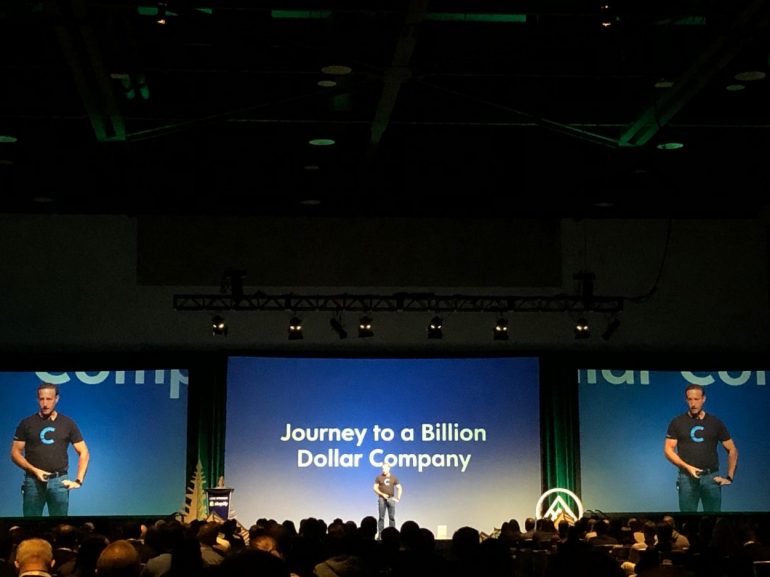After stepping into the CEO role at identity verification provider Trulioo, Steve Munford was at the helm of a nearly half-billion dollar Series D fundraise, putting the company firmly in the unicorn club with a $2 billion CAD valuation. As a seasoned tech executive, Munford has led multiple companies through big growth rounds like this, and it’s led him to see the tech ecosystem from a vantage point few people ever get to access.
Speaking with BetaKit ahead of his talk at SAAS NORTH, Munford shared a possibly unpopular opinion – that Canada doesn’t need more unicorns – and what he thinks is the right approach to growth for Canadian tech founders.
“We don’t need more unicorns”
When the term “unicorn” was coined in 2013 by venture capitalist Aileen Lee in a TechCrunch article, tech companies with a $1 billion valuation were a statistical anomaly, with only 0.7 percent of venture-backed companies (39 in total) reaching this mythical status.
This year alone saw 366 unicorns, according to CB Insights.
RELATED: Announcing the SAAS NORTH BetaKit Keynote Stage
The explosion in unicorn status has led Munford to be concerned that a $1 billion valuation is old hat. Even in Canada, historically low on unicorns, Munford predicts a $1 billion valuation won’t be a great marker of success.
“We don’t need more unicorns,” Munford said plainly.
Instead of chasing unicorn status, Munford wants to see founders “with ambitions to be the leaders in their business” and who are willing to be whatever size – big or small – they need to in order to accomplish that feat. He added this is Trulioo’s ultimate goal, and that reaching a large valuation is a step along the way but not a success by itself.
In response to the cool-factor of “unicorn” status, Munford wasn’t that intrigued, saying that a $1 billion valuation, whether by exiting or due to fundraising hype, is interesting but ultimately doesn’t indicate much.
The factors empowering global leaders from Canada
Regardless of being a unicorn or not, Munford is hopeful that more Canadian companies will be able to become global leaders in their field, citing four specific trends that are making it more possible than ever.
1. Cross-border capital flow: Munford said that there’s significant cross-border capital now, something almost unheard of 20 years ago.
2. Serial entrepreneurs: One thing that gets Munford particularly excited is entrepreneurs who have had successful exits coming back to either build another company in Canada or actively mentor and work with new startups to help them become global disruptors at scale.
3. Serial executives: On top of founders returning for round two, Munford is excited to see executives “recycle themselves” in Canada, performing the same kinds of senior leadership roles at multiple different startups. He’s also heartened to see Canadian tech executives who moved abroad returning home with their expertise and networks.
4. Supportive government infrastructure: Munford cited tax credits for R&D, support for accelerator programs, and Canada’s more open immigration policies as useful tools for startups in the country.
However excited he is, Munford is also concerned about two key issues he sees impeding startup growth. The first is that he feels Canadians have a mindset to “declare victory too early and sell out,” resulting in lower valuations and less impact created domestically. He added that this tendency likely informs his “annoyance” with the term unicorn – he said chasing unicorn status implies being a unicorn is an end by itself, versus a step in a larger journey.
The second issue Munford sees is the current necessity of Canadian companies needing a dual HQ as they scale. He said most companies, if they want to remain Canadian, will still need to set up an HQ office in the United States. While he feels this effort is usually valuable, it still takes time, effort, and investment to do well, combined with ongoing challenges to balance the two-headed company.
Advice for ambitious founders
For founders that want their businesses to be global leaders, Munford has four tips:
1. Focus on product-market fit first: Munford said to be relentlessly focused on the market you feel you can win first, then be aggressive about having a small piece of that and achieving dominance in that market.
2. Build a culture that allows you to bring in new people: Munford cautioned founders to not get stuck in a culture that suggests your team from the past must be your team today, or that your team today needs to stay for years in order to scale.
3. Choose your capital partner carefully: Munford said it’s important to think about who you’re taking money from, adding that “too often, founders think all money is created equal. It’s not.”
4. “Eat when served”: This is Munford’s mantra for landing and expanding with customers. He said founders shouldn’t try to grab all the business they can today. Instead, invest time in solving the challenge in front of you – for example, working with a specific department or a specific country’s headquarters versus pushing for a global deal – and expand once you’ve proven you can deliver on the value you promise.
Global powerhouses focus on independence
The final word of wisdom Munford shared for founders is to focus on future scale and independence, not on your exit or your valuation. Hitting this long term potential is a result of capital, talent, and culture. But the seeds begin with the CEO.
“Most of it comes from the CEO, this culture of ambition,” said Munford. “This relentless focus on what the potential is, of what we’re going to be. If you start with that mindset, you’ll put together the pieces that are long term versus short term.”
Use the code “BetaKit30” for a 30% discount on tickets to Canada’s top SaaS conference!

